Cell Biology
Immunology
Cancer Research
Pharmaceutical Development
Diagnostics
Instruments
Reagents
Software
Accessories
Services
Academic Research
Clinical Laboratories
Pharmaceutical Companies
Biotechnology Companies
Contract Research Organizations
Cell Sorting
Cell Analyzers
High-Throughput Screening
Multicolor Analysis
North America
Europe
South America
Asia Pacific
Middle East and Africa
North America Outlook (USD Billion, 2019-2035)
North America Flow Cytometry Market by Application Type
Cell Biology
Immunology
Cancer Research
Pharmaceutical Development
Diagnostics
North America Flow Cytometry Market by Type
Instruments
Reagents
Software
Accessories
Services
North America Flow Cytometry Market by End Use Type
Academic Research
Clinical Laboratories
Pharmaceutical Companies
Biotechnology Companies
Contract Research Organizations
North America Flow Cytometry Market by Technology Type
Cell Sorting
Cell Analyzers
High-Throughput Screening
Multicolor Analysis
North America Flow Cytometry Market by Regional Type
US
Canada
US Outlook (USD Billion, 2019-2035)
US Flow Cytometry Market by Application Type
Cell Biology
Immunology
Cancer Research
Pharmaceutical Development
Diagnostics
US Flow Cytometry Market by Type
Instruments
Reagents
Software
Accessories
Services
US Flow Cytometry Market by End Use Type
Academic Research
Clinical Laboratories
Pharmaceutical Companies
Biotechnology Companies
Contract Research Organizations
US Flow Cytometry Market by Technology Type
Cell Sorting
Cell Analyzers
High-Throughput Screening
Multicolor Analysis
CANADA Outlook (USD Billion, 2019-2035)
CANADA Flow Cytometry Market by Application Type
Cell Biology
Immunology
Cancer Research
Pharmaceutical Development
Diagnostics
CANADA Flow Cytometry Market by Type
Instruments
Reagents
Software
Accessories
Services
CANADA Flow Cytometry Market by End Use Type
Academic Research
Clinical Laboratories
Pharmaceutical Companies
Biotechnology Companies
Contract Research Organizations
CANADA Flow Cytometry Market by Technology Type
Cell Sorting
Cell Analyzers
High-Throughput Screening
Multicolor Analysis
Europe Outlook (USD Billion, 2019-2035)
Europe Flow Cytometry Market by Application Type
Cell Biology
Immunology
Cancer Research
Pharmaceutical Development
Diagnostics
Europe Flow Cytometry Market by Type
Instruments
Reagents
Software
Accessories
Services
Europe Flow Cytometry Market by End Use Type
Academic Research
Clinical Laboratories
Pharmaceutical Companies
Biotechnology Companies
Contract Research Organizations
Europe Flow Cytometry Market by Technology Type
Cell Sorting
Cell Analyzers
High-Throughput Screening
Multicolor Analysis
Europe Flow Cytometry Market by Regional Type
Germany
UK
France
Russia
Italy
Spain
Rest of Europe
GERMANY Outlook (USD Billion, 2019-2035)
GERMANY Flow Cytometry Market by Application Type
Cell Biology
Immunology
Cancer Research
Pharmaceutical Development
Diagnostics
GERMANY Flow Cytometry Market by Type
Instruments
Reagents
Software
Accessories
Services
GERMANY Flow Cytometry Market by End Use Type
Academic Research
Clinical Laboratories
Pharmaceutical Companies
Biotechnology Companies
Contract Research Organizations
GERMANY Flow Cytometry Market by Technology Type
Cell Sorting
Cell Analyzers
High-Throughput Screening
Multicolor Analysis
UK Outlook (USD Billion, 2019-2035)
UK Flow Cytometry Market by Application Type
Cell Biology
Immunology
Cancer Research
Pharmaceutical Development
Diagnostics
UK Flow Cytometry Market by Type
Instruments
Reagents
Software
Accessories
Services
UK Flow Cytometry Market by End Use Type
Academic Research
Clinical Laboratories
Pharmaceutical Companies
Biotechnology Companies
Contract Research Organizations
UK Flow Cytometry Market by Technology Type
Cell Sorting
Cell Analyzers
High-Throughput Screening
Multicolor Analysis
FRANCE Outlook (USD Billion, 2019-2035)
FRANCE Flow Cytometry Market by Application Type
Cell Biology
Immunology
Cancer Research
Pharmaceutical Development
Diagnostics
FRANCE Flow Cytometry Market by Type
Instruments
Reagents
Software
Accessories
Services
FRANCE Flow Cytometry Market by End Use Type
Academic Research
Clinical Laboratories
Pharmaceutical Companies
Biotechnology Companies
Contract Research Organizations
FRANCE Flow Cytometry Market by Technology Type
Cell Sorting
Cell Analyzers
High-Throughput Screening
Multicolor Analysis
RUSSIA Outlook (USD Billion, 2019-2035)
RUSSIA Flow Cytometry Market by Application Type
Cell Biology
Immunology
Cancer Research
Pharmaceutical Development
Diagnostics
RUSSIA Flow Cytometry Market by Type
Instruments
Reagents
Software
Accessories
Services
RUSSIA Flow Cytometry Market by End Use Type
Academic Research
Clinical Laboratories
Pharmaceutical Companies
Biotechnology Companies
Contract Research Organizations
RUSSIA Flow Cytometry Market by Technology Type
Cell Sorting
Cell Analyzers
High-Throughput Screening
Multicolor Analysis
ITALY Outlook (USD Billion, 2019-2035)
ITALY Flow Cytometry Market by Application Type
Cell Biology
Immunology
Cancer Research
Pharmaceutical Development
Diagnostics
ITALY Flow Cytometry Market by Type
Instruments
Reagents
Software
Accessories
Services
ITALY Flow Cytometry Market by End Use Type
Academic Research
Clinical Laboratories
Pharmaceutical Companies
Biotechnology Companies
Contract Research Organizations
ITALY Flow Cytometry Market by Technology Type
Cell Sorting
Cell Analyzers
High-Throughput Screening
Multicolor Analysis
SPAIN Outlook (USD Billion, 2019-2035)
SPAIN Flow Cytometry Market by Application Type
Cell Biology
Immunology
Cancer Research
Pharmaceutical Development
Diagnostics
SPAIN Flow Cytometry Market by Type
Instruments
Reagents
Software
Accessories
Services
SPAIN Flow Cytometry Market by End Use Type
Academic Research
Clinical Laboratories
Pharmaceutical Companies
Biotechnology Companies
Contract Research Organizations
SPAIN Flow Cytometry Market by Technology Type
Cell Sorting
Cell Analyzers
High-Throughput Screening
Multicolor Analysis
REST OF EUROPE Outlook (USD Billion, 2019-2035)
REST OF EUROPE Flow Cytometry Market by Application Type
Cell Biology
Immunology
Cancer Research
Pharmaceutical Development
Diagnostics
REST OF EUROPE Flow Cytometry Market by Type
Instruments
Reagents
Software
Accessories
Services
REST OF EUROPE Flow Cytometry Market by End Use Type
Academic Research
Clinical Laboratories
Pharmaceutical Companies
Biotechnology Companies
Contract Research Organizations
REST OF EUROPE Flow Cytometry Market by Technology Type
Cell Sorting
Cell Analyzers
High-Throughput Screening
Multicolor Analysis
APAC Outlook (USD Billion, 2019-2035)
APAC Flow Cytometry Market by Application Type
Cell Biology
Immunology
Cancer Research
Pharmaceutical Development
Diagnostics
APAC Flow Cytometry Market by Type
Instruments
Reagents
Software
Accessories
Services
APAC Flow Cytometry Market by End Use Type
Academic Research
Clinical Laboratories
Pharmaceutical Companies
Biotechnology Companies
Contract Research Organizations
APAC Flow Cytometry Market by Technology Type
Cell Sorting
Cell Analyzers
High-Throughput Screening
Multicolor Analysis
APAC Flow Cytometry Market by Regional Type
China
India
Japan
South Korea
Malaysia
Thailand
Indonesia
Rest of APAC
CHINA Outlook (USD Billion, 2019-2035)
CHINA Flow Cytometry Market by Application Type
Cell Biology
Immunology
Cancer Research
Pharmaceutical Development
Diagnostics
CHINA Flow Cytometry Market by Type
Instruments
Reagents
Software
Accessories
Services
CHINA Flow Cytometry Market by End Use Type
Academic Research
Clinical Laboratories
Pharmaceutical Companies
Biotechnology Companies
Contract Research Organizations
CHINA Flow Cytometry Market by Technology Type
Cell Sorting
Cell Analyzers
High-Throughput Screening
Multicolor Analysis
INDIA Outlook (USD Billion, 2019-2035)
INDIA Flow Cytometry Market by Application Type
Cell Biology
Immunology
Cancer Research
Pharmaceutical Development
Diagnostics
INDIA Flow Cytometry Market by Type
Instruments
Reagents
Software
Accessories
Services
INDIA Flow Cytometry Market by End Use Type
Academic Research
Clinical Laboratories
Pharmaceutical Companies
Biotechnology Companies
Contract Research Organizations
INDIA Flow Cytometry Market by Technology Type
Cell Sorting
Cell Analyzers
High-Throughput Screening
Multicolor Analysis
JAPAN Outlook (USD Billion, 2019-2035)
JAPAN Flow Cytometry Market by Application Type
Cell Biology
Immunology
Cancer Research
Pharmaceutical Development
Diagnostics
JAPAN Flow Cytometry Market by Type
Instruments
Reagents
Software
Accessories
Services
JAPAN Flow Cytometry Market by End Use Type
Academic Research
Clinical Laboratories
Pharmaceutical Companies
Biotechnology Companies
Contract Research Organizations
JAPAN Flow Cytometry Market by Technology Type
Cell Sorting
Cell Analyzers
High-Throughput Screening
Multicolor Analysis
SOUTH KOREA Outlook (USD Billion, 2019-2035)
SOUTH KOREA Flow Cytometry Market by Application Type
Cell Biology
Immunology
Cancer Research
Pharmaceutical Development
Diagnostics
SOUTH KOREA Flow Cytometry Market by Type
Instruments
Reagents
Software
Accessories
Services
SOUTH KOREA Flow Cytometry Market by End Use Type
Academic Research
Clinical Laboratories
Pharmaceutical Companies
Biotechnology Companies
Contract Research Organizations
SOUTH KOREA Flow Cytometry Market by Technology Type
Cell Sorting
Cell Analyzers
High-Throughput Screening
Multicolor Analysis
MALAYSIA Outlook (USD Billion, 2019-2035)
MALAYSIA Flow Cytometry Market by Application Type
Cell Biology
Immunology
Cancer Research
Pharmaceutical Development
Diagnostics
MALAYSIA Flow Cytometry Market by Type
Instruments
Reagents
Software
Accessories
Services
MALAYSIA Flow Cytometry Market by End Use Type
Academic Research
Clinical Laboratories
Pharmaceutical Companies
Biotechnology Companies
Contract Research Organizations
MALAYSIA Flow Cytometry Market by Technology Type
Cell Sorting
Cell Analyzers
High-Throughput Screening
Multicolor Analysis
THAILAND Outlook (USD Billion, 2019-2035)
THAILAND Flow Cytometry Market by Application Type
Cell Biology
Immunology
Cancer Research
Pharmaceutical Development
Diagnostics
THAILAND Flow Cytometry Market by Type
Instruments
Reagents
Software
Accessories
Services
THAILAND Flow Cytometry Market by End Use Type
Academic Research
Clinical Laboratories
Pharmaceutical Companies
Biotechnology Companies
Contract Research Organizations
THAILAND Flow Cytometry Market by Technology Type
Cell Sorting
Cell Analyzers
High-Throughput Screening
Multicolor Analysis
INDONESIA Outlook (USD Billion, 2019-2035)
INDONESIA Flow Cytometry Market by Application Type
Cell Biology
Immunology
Cancer Research
Pharmaceutical Development
Diagnostics
INDONESIA Flow Cytometry Market by Type
Instruments
Reagents
Software
Accessories
Services
INDONESIA Flow Cytometry Market by End Use Type
Academic Research
Clinical Laboratories
Pharmaceutical Companies
Biotechnology Companies
Contract Research Organizations
INDONESIA Flow Cytometry Market by Technology Type
Cell Sorting
Cell Analyzers
High-Throughput Screening
Multicolor Analysis
REST OF APAC Outlook (USD Billion, 2019-2035)
REST OF APAC Flow Cytometry Market by Application Type
Cell Biology
Immunology
Cancer Research
Pharmaceutical Development
Diagnostics
REST OF APAC Flow Cytometry Market by Type
Instruments
Reagents
Software
Accessories
Services
REST OF APAC Flow Cytometry Market by End Use Type
Academic Research
Clinical Laboratories
Pharmaceutical Companies
Biotechnology Companies
Contract Research Organizations
REST OF APAC Flow Cytometry Market by Technology Type
Cell Sorting
Cell Analyzers
High-Throughput Screening
Multicolor Analysis
South America Outlook (USD Billion, 2019-2035)
South America Flow Cytometry Market by Application Type
Cell Biology
Immunology
Cancer Research
Pharmaceutical Development
Diagnostics
South America Flow Cytometry Market by Type
Instruments
Reagents
Software
Accessories
Services
South America Flow Cytometry Market by End Use Type
Academic Research
Clinical Laboratories
Pharmaceutical Companies
Biotechnology Companies
Contract Research Organizations
South America Flow Cytometry Market by Technology Type
Cell Sorting
Cell Analyzers
High-Throughput Screening
Multicolor Analysis
South America Flow Cytometry Market by Regional Type
Brazil
Mexico
Argentina
Rest of South America
BRAZIL Outlook (USD Billion, 2019-2035)
BRAZIL Flow Cytometry Market by Application Type
Cell Biology
Immunology
Cancer Research
Pharmaceutical Development
Diagnostics
BRAZIL Flow Cytometry Market by Type
Instruments
Reagents
Software
Accessories
Services
BRAZIL Flow Cytometry Market by End Use Type
Academic Research
Clinical Laboratories
Pharmaceutical Companies
Biotechnology Companies
Contract Research Organizations
BRAZIL Flow Cytometry Market by Technology Type
Cell Sorting
Cell Analyzers
High-Throughput Screening
Multicolor Analysis
MEXICO Outlook (USD Billion, 2019-2035)
MEXICO Flow Cytometry Market by Application Type
Cell Biology
Immunology
Cancer Research
Pharmaceutical Development
Diagnostics
MEXICO Flow Cytometry Market by Type
Instruments
Reagents
Software
Accessories
Services
MEXICO Flow Cytometry Market by End Use Type
Academic Research
Clinical Laboratories
Pharmaceutical Companies
Biotechnology Companies
Contract Research Organizations
MEXICO Flow Cytometry Market by Technology Type
Cell Sorting
Cell Analyzers
High-Throughput Screening
Multicolor Analysis
ARGENTINA Outlook (USD Billion, 2019-2035)
ARGENTINA Flow Cytometry Market by Application Type
Cell Biology
Immunology
Cancer Research
Pharmaceutical Development
Diagnostics
ARGENTINA Flow Cytometry Market by Type
Instruments
Reagents
Software
Accessories
Services
ARGENTINA Flow Cytometry Market by End Use Type
Academic Research
Clinical Laboratories
Pharmaceutical Companies
Biotechnology Companies
Contract Research Organizations
ARGENTINA Flow Cytometry Market by Technology Type
Cell Sorting
Cell Analyzers
High-Throughput Screening
Multicolor Analysis
REST OF SOUTH AMERICA Outlook (USD Billion, 2019-2035)
REST OF SOUTH AMERICA Flow Cytometry Market by Application Type
Cell Biology
Immunology
Cancer Research
Pharmaceutical Development
Diagnostics
REST OF SOUTH AMERICA Flow Cytometry Market by Type
Instruments
Reagents
Software
Accessories
Services
REST OF SOUTH AMERICA Flow Cytometry Market by End Use Type
Academic Research
Clinical Laboratories
Pharmaceutical Companies
Biotechnology Companies
Contract Research Organizations
REST OF SOUTH AMERICA Flow Cytometry Market by Technology Type
Cell Sorting
Cell Analyzers
High-Throughput Screening
Multicolor Analysis
MEA Outlook (USD Billion, 2019-2035)
MEA Flow Cytometry Market by Application Type
Cell Biology
Immunology
Cancer Research
Pharmaceutical Development
Diagnostics
MEA Flow Cytometry Market by Type
Instruments
Reagents
Software
Accessories
Services
MEA Flow Cytometry Market by End Use Type
Academic Research
Clinical Laboratories
Pharmaceutical Companies
Biotechnology Companies
Contract Research Organizations
MEA Flow Cytometry Market by Technology Type
Cell Sorting
Cell Analyzers
High-Throughput Screening
Multicolor Analysis
MEA Flow Cytometry Market by Regional Type
GCC Countries
South Africa
Rest of MEA
GCC COUNTRIES Outlook (USD Billion, 2019-2035)
GCC COUNTRIES Flow Cytometry Market by Application Type
Cell Biology
Immunology
Cancer Research
Pharmaceutical Development
Diagnostics
GCC COUNTRIES Flow Cytometry Market by Type
Instruments
Reagents
Software
Accessories
Services
GCC COUNTRIES Flow Cytometry Market by End Use Type
Academic Research
Clinical Laboratories
Pharmaceutical Companies
Biotechnology Companies
Contract Research Organizations
GCC COUNTRIES Flow Cytometry Market by Technology Type
Cell Sorting
Cell Analyzers
High-Throughput Screening
Multicolor Analysis
SOUTH AFRICA Outlook (USD Billion, 2019-2035)
SOUTH AFRICA Flow Cytometry Market by Application Type
Cell Biology
Immunology
Cancer Research
Pharmaceutical Development
Diagnostics
SOUTH AFRICA Flow Cytometry Market by Type
Instruments
Reagents
Software
Accessories
Services
SOUTH AFRICA Flow Cytometry Market by End Use Type
Academic Research
Clinical Laboratories
Pharmaceutical Companies
Biotechnology Companies
Contract Research Organizations
SOUTH AFRICA Flow Cytometry Market by Technology Type
Cell Sorting
Cell Analyzers
High-Throughput Screening
Multicolor Analysis
REST OF MEA Outlook (USD Billion, 2019-2035)
REST OF MEA Flow Cytometry Market by Application Type
Cell Biology
Immunology
Cancer Research
Pharmaceutical Development
Diagnostics
REST OF MEA Flow Cytometry Market by Type
Instruments
Reagents
Software
Accessories
Services
REST OF MEA Flow Cytometry Market by End Use Type
Academic Research
Clinical Laboratories
Pharmaceutical Companies
Biotechnology Companies
Contract Research Organizations
REST OF MEA Flow Cytometry Market by Technology Type
Cell Sorting
Cell Analyzers
High-Throughput Screening
Multicolor Analysis
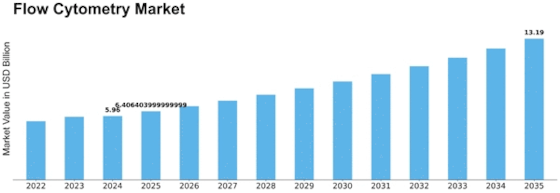


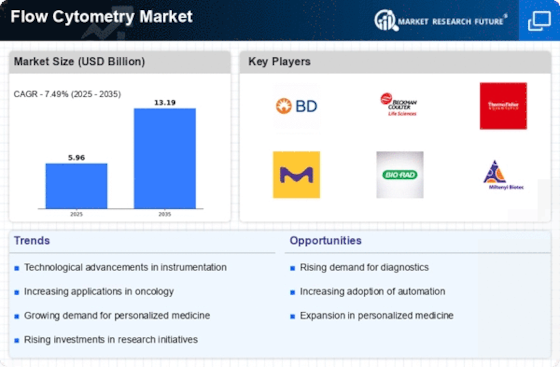
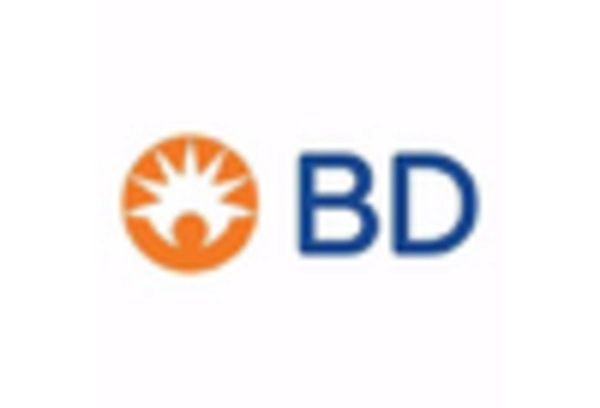
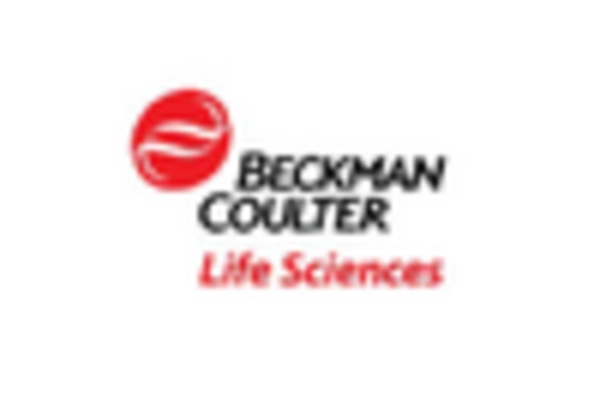


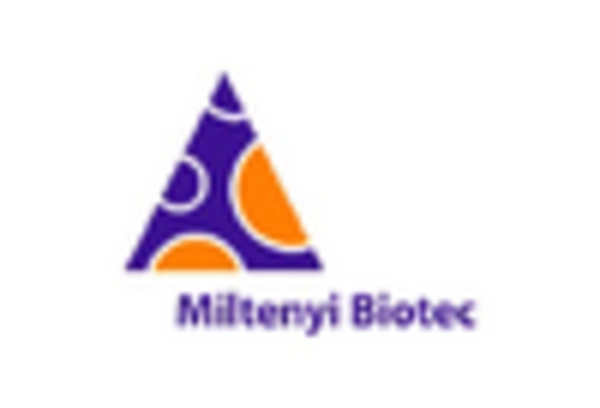










Leave a Comment